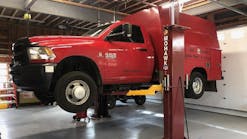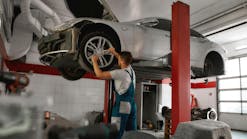SAE reconfirms Honeywell's low-global-warming refrigerant as safe and effective
Honeywell recenltly announced that SAE International, the automotive engineering organization, has reconfirmed that Honeywell's new low-global-warming-potential mobile air conditioning refrigerant, HFO-1234yf, is "safe and effective to use in automotive applications."
SAE International's Cooperative Research Project (CRP) said that it has carefully evaluated extensive testing on HFO-1234yf, including collision scenarios, and has reconfirmed its finding that HFO-1234yf is safe for use in automobile air conditioning, Honeywell noted.
The evaluation involved technical experts from Fiat-Chrysler, Ford, General Motors, Honda, Hyundai, Jaguar Land Rover, Mazda, PSA Peugeot Citroen, Renault and Toyota.
The CRP also concluded that a test conducted by Daimler late last year, which raised questions about safety, was "unrealistic" and "not an appropriate test to verify the safety of refrigerant applications in vehicles" because it "did not include any actual vehicle collisions or the mitigating factors that occur in an actual collision," Honeywell noted.
"The CRP's recent announcement again confirms that HFO-1234yf is safe for use in mobile air conditioning," said Dr. Ian Shankland, chief technology officer for Honeywell performance materials and technologies. "Extensive testing by global automakers and third-party experts alike proves that HFO-1234yf is safe. HFO-1234yf is being readily adopted by automakers around the world because of its safety, effectiveness and availability today to meet environmental regulations such as the European Union's Mobile Air Conditioning (MAC) directive."
HFO-1234yf was the subject of comprehensive testing conducted by an SAE CRP from 2007 to 2009, Honeywell noted. That CRP, which was sponsored by 15 global automakers, including all leading German automakers, major suppliers and 18 international, independent research institutes, concluded that HFO-1234yf is safe for use in automobile applications.
SAE initiated the latest CRP after Daimler raised questions about the refrigerant's flammability in the event of a crash. Those questions were based on in-house testing of Daimler's own vehicles without the participation of any reputable third party and without consultation with others in the industry, Honeywell noted. The SAE concluded that "the risk of passenger exposure to a vehicle fire associated with this refrigerant is exceptionally remote."
"The SAE CRP team of OEMs has concluded that the refrigerant release testing conducted by Daimler is unrealistic and that it is not an appropriate test to verify the safety of refrigerant applications in vehicles," the SAE said in its announcement. "The Daimler testing did not include any actual vehicle collisions or the mitigating factors that occur in an actual collision."
By comparison, the CRP said its safety evaluation, which used fault-tree analysis, "is the most appropriate approach for evaluating risks of new alternative refrigerants." Fault-tree analysis, which evaluates the probability of a safety accident, has been recommended and employed by numerous public and private organizations including the U.S. Environmental Protection Agency, the U.S. Department of Energy, the International Electrotechnical Commission, the European Union Joint Research Centre and the United Kingdom Health and Safety Executive.
HFO-1234yf is being adopted by automakers in part to meet the European Union's MAC Directive, which aims to reduce the greenhouse gas emissions of air-conditioning systems in passenger cars and light commercial vehicles. The directive requires that refrigerants in all new type vehicles sold in Europe after Jan. 1, 2013, have a global-warming potential (GWP) below 150 and that all cars sold after 2017 meet the lower GWP requirement. HFO-1234yf has a GWP of 4, compared with the current refrigerant, HFC-134a, which has a GWP of 1,430.

